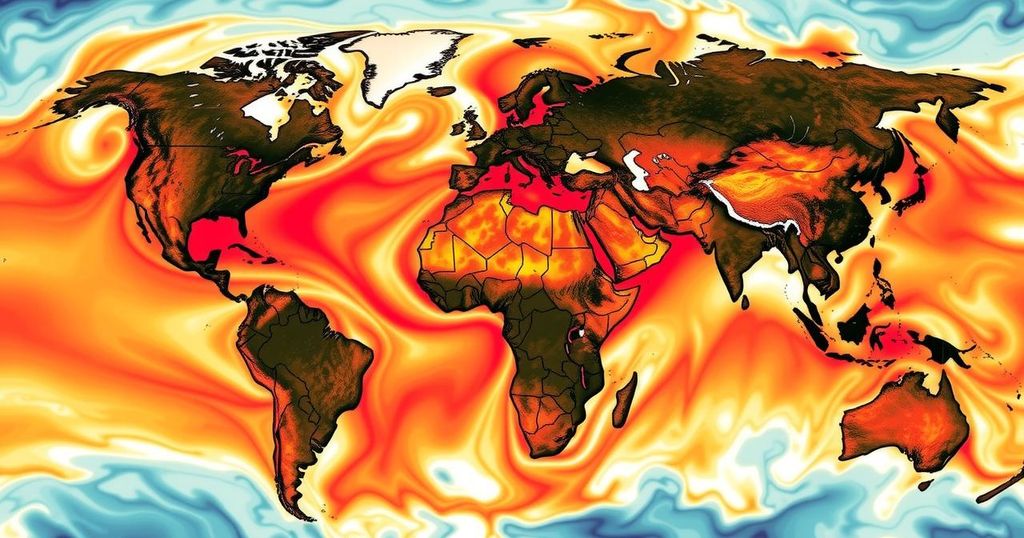The year 2024 marked a critical shift in climate change, with global temperatures surpassing 1.5°C above pre-industrial levels for the first time. Extreme weather events including severe flooding, droughts, and intense heat waves complicated the global climate narrative. The Copernicus Climate Change Service report indicates that urgent actions are required to address the implications of these changes, emphasizing the necessity for emission reductions and climate resilience.
In 2024, global temperatures surpassed the alarming milestone of 1.5°C above pre-industrial levels for the first time on record, as confirmed by the EU’s Copernicus Climate Change Service. Extreme weather events marked the year: devastating flooding in Pakistan and Afghanistan, unprecedented droughts in the Amazon, and dangerous heat in Athens, where the Acropolis was temporarily closed for tourist safety.
All continents, except Australasia and Antarctica, recorded their hottest year yet. Notably, sustained temperatures throughout the year eclipsed the 1.5°C threshold for 11 months. The prior record-holder for hottest year was 2023. The systematic rise in global temperatures has reached alarming heights, with the past decade accounting for all ten of the hottest years recorded thus far.
The Copernicus scientists employed sophisticated reanalysis techniques to assess the current climatic shifts, integrating a variety of observational data to form a comprehensive account of the year’s profound temperature increases. Reducing global warming under 1.5°C is of utmost importance, resonating with the targets set forth in the Paris Agreement aimed at limiting climate change. More critically, though, this brief surpassing of the 1.5°C mark does not equate to a crossing of the threshold defined by the agreement, which refers to long-term averages rather than annual anomalies. Currently, that long-term average rests around 1.3°C.
The role of natural climatic factors, such as a significant El Niño, contributed to a rise in temperatures over the year. This phenomenon is known to influence global weather patterns, raising average temperatures while exacerbating extreme weather events in certain locales. As vital as these targets are for policymakers, research indicates that even the smallest increments in temperature elevation—such as what occurred in 2024—can lead to catastrophic consequences, like the rapid melting of ice sheets and other severe environmental changes.
Particularly in Europe, 2024 witnessed the most severe heat waves, wreaking havoc across southern and eastern regions. A notable 44% of the world’s landmass faced strong or higher heat stress during July alone, which poses significant health risks, especially in lower-income countries. The report also noted a 5% increase in atmospheric moisture content, complicating precipitation patterns and heightening the intensity of rainfall events. For instance, destructive flooding occurred in regions like Valencia, Spain, in October.
To mitigate the risks associated with ongoing climate extremities, a rapid reduction of greenhouse gas emissions is imperative alongside adaptation strategies to protect affected populations and infrastructure. The climatic conditions of 2025 remain uncertain, yet the record set in 2024 underscores the profound impact of human-induced climate change and serves as a critical warning that demands immediate global attention.
The Copernicus Climate Change Service report reveals that 2024 was a pivotal year in terms of climate change, marking the first occasion in which global temperatures exceeded 1.5°C above pre-industrial averages. This significant milestone prompted discussions about the need for urgent climate action as extreme weather events increasingly impact ecosystems and human populations. Understanding the intricate relationship between industrial activities, natural climate phenomena, and long-term global warming trends is essential for comprehending and addressing the challenges posed by climate change.
The unprecedented temperature increase in 2024 highlights the urgent need for global action to combat climate change. While natural phenomena like El Niño influenced this year’s temperatures, the overwhelming human impact on climate cannot be ignored. Continuous efforts to reduce greenhouse gas emissions and adapt to the ensuing climatic challenges are crucial for safeguarding the future of both humanity and the planet. Each fraction of a degree matters in preventing irreversible damage to our environment.
Original Source: theconversation.com






